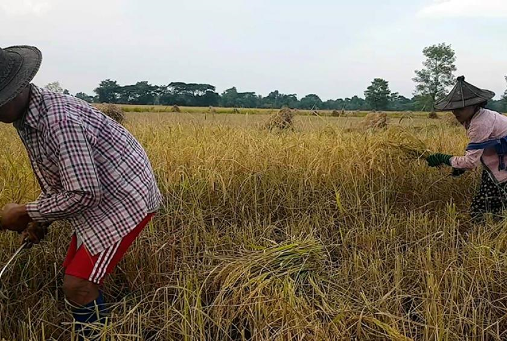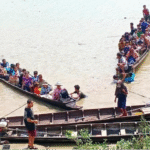An interview with a farmer from Mone Township about the difficulties faced by farmers in Nyaunglebin District, Bago Region, following the military coup
Nyaunglebin District in Bago Region, which is under the control of the Karen National Union (KNU) Brigade (3), has the highest number of internally displaced persons (IDPs) among KNU-controlled districts due to the armed conflict resulting from the recent military coup.
Rice farming, which is the main source of income for locals, has also suffered from the armed conflict between the two sides, human rights violations, the risk of displacement, and transportation restrictions imposed by the military council.
To learn more about the ongoing difficulties faced by farmers in Nyaunglebin District, Bago Region, the Karen Information Center interviewed a farmer from Mone Township.
Q: We’ve heard that the military council is restricting the transportation of goods in Nyaunglebin District. Can you tell us about the situation?
A: Currently, the situation is that they don’t allow farmers to transport materials such as fertilizers and pesticides from one place to another. This restriction has been in place for a long time. So, we have to transport them indirectly through jungle routes or waterways. The military has set up a series of checkpoints along the road. This has made it very difficult to transport food, fuel, and diesel for crops.
Q: What difficulties are farmers facing during harvest as they have also been displaced?
A: Now is the rice harvesting season. But we can’t harvest. In the areas close to the road, many rice fields can’t be harvested. In Talaingkhin village in Kyauktaga Township, residents had to flee because of a gunfight. After the clash, military council soldiers brought harvesting machines to the residents’ rice fields. The situation is so bad. In Mone Township, 300 to 400 acres of rice fields have been yellowed by flooding. The floods caused by the heavy rain and river water have severely damaged the fields. Not only because of the floods, but also because harvesting can’t be done freely and there are transport restrictions, farmers face all kinds of difficulties.
Q: What difficulties do farmers face in transporting rice after harvest? Can you explain in detail?
A: We have four or five combined machines here. These machines alone can’t handle so many acres, so we have other difficulties. Some farmers dry and store the rice in the barns after harvest. Since it is the rainy season, it is difficult for them to take the rice out and sell when transportation is restricted. As for transportation, we live on the east bank of the Sittaung River, so we have difficulty transporting the rice to the west bank. We know one or two rice brokers, but they also have to sell the rice on the west bank.
Q: What about the current price of rice? Is it enough to cover the operating costs?
A: Right now, the price for 100 baskets of rice is only 700,000 kyat, which is much less than the previous rate of 1 million kyat. However, we’re finding it hard to sell the rice because there are restrictions on transportation. Both farmers and traders are also facing restrictions. Therefore, some farmers only harvest and store in the barns, hoping for good selling days. Some of them have to sell at low prices because they have to bear the labor costs. Considering the investment costs incurred by farmers, including expenses for weed killers and fertilizers, a rice price of 800,000 kyat is still enough.”
Q: Is this situation being experienced throughout the whole Nyaunglebin District?”
A: Yes, in the whole Nyaunglebin District. It is harvesting time now, and farmers want to harvest. But the rice fields near the road from Kyaukkyi to Natthankwin can’t be harvested because of instability and ongoing clashes. Last year, the situation was similar. We had to leave the harvest behind to go to waste. But the fields that are a little further from this road can be harvested. However, there are still difficulties in selling and transporting. Before the coup, the price of rice was normal and transportation was smooth. After the coup, things have become as they are now. Because of the ongoing clashes and instability in our region, farmers will probably continue to face this situation.
Sent by KIC.



